Overview
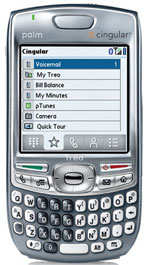
Yesterday witnessed a fairly significant entry into the mobile
market, an Apple cellphone. TreoCentral's Michael Ducker covered the
event live at Macworld San Francisco, photos and a live-blog of the
event are available here, (photoset here)." Today, he and Dieter Bohn share a conversation about
where they feel the Treo's strengths and weaknesses are in regards to
this giant coming into the market.
If you somehow missed the excitement, the iPhone is a full screen
iPod, cellphone, and internet communicator in one tiny 11.6mm thick
package. It has a 3.5 inch, 320x480px, gorgeous touchscreen display,
and has built-in Quad band GSM/EDGE, Wifi, and Bluetooth 2.0. The
touchscreen is the most revolutionary new feature, as it uses a new
technology that allows more than one finger to be tracked on the
display at once, allowing for some nifty gesture-based actions The
screen also has a virtual qwerty keyboard. It will ship exclusively
on Cingular this June for $499, 4 GB, and $599, 8 GB models.
Apple introduced a new mobile operating system into the mix as well,
OS X. Supposedly this means that the iPhone will run all the same
APIs that current Macs can run, such as CoreAnimation (allowing great
beautiful graphics to be easily created), or WebKit (a very good open-
source standards based web browser used by Nokia and Apple). It ships
with a POP3/IMAP client, Google Maps, and a host of normal PIM
applications. Applications are called "Widgets"; two widgets demoed
were Weather and Stocks, both of which look identical to their Mac OS
X counterparts.
So why does this matter to Treo users? Apple is a new market force
that Palm will be competing against, in addition to HTC, Blackberry,
and Motorola. The Treo will be now be compared to Apple's phone
products. Palm's success will be dependent on their ability to make
products that are superior in either different markets, or in the
same niche as the iPhone. The Treo's competitive future depends on it.
Read on for Michael and Dieter's thoughts on the iPhone and the Treo.
Dieter Bohn: So, iPhone, eh?
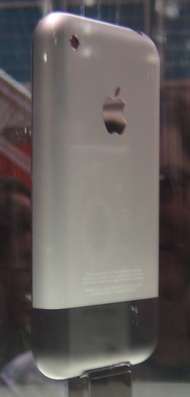
Michael Ducker: It's quite the entrant to the cellphone market. I
was 15 rows back at Steve Jobs' keynote live in San Francisco - and I
got to spend some time oggling the rotating display that Apple had in
their booth.
Dieter Bohn: Well, let's be fair here, I don't know that we can
call it an "entrant" just yet, technically it's still vaporware. ;)
Which raises an interesting question for me, as far as the Treo goes
- how can Palm compete with a popular product that won't even exist
in the market for another 6 months? How does Palm deal with that?
Michael Ducker: Ok, I'll give you that. It is vaporware. But it
is some very impressive vaporware. I think it lives up to the hype
that has built up for the last two years. I am sure that over the
next six months, anticipation and hype for the product will only
build (duh).
It's a tough proposition for Palm. The Treo 680 was meant to be the
first serious entrant Palm had into the "prosumer" market last
October. There was that large marketing blitz, too, in magazines,
airports and cities nationwide.
So, the launch of a much slicker, more hyped, sexier, and possibly
more powerful device certainly has to make Palm think a bit about
their marketing.
Dieter Bohn: Just their marketing?!
Feature Fight!
Michael Ducker: Well, let's start with marketing, anyway. I
spoke with Marlene Somsak, VP of Corporate Communications earlier
today and asked "How do you compete with vaporware?" She said, "You
sell the product that only costs half as much, and is available now.
Palm's not going to try to market against product that they haven't
seen yet."
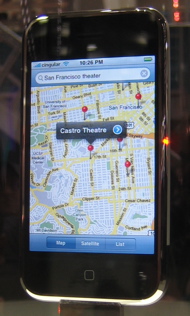
Dieter Bohn: Zing. It does make sense that Palm doesn't want to
suddenly shift their entire strategy just because Apple has announced
a new device. Lemme back up... You called the 680 a 'prosumer'
device, which is perhaps not quite right. It's really more of a
consumer phone, isn't it? It's inexpensive, cute, and largely aimed
at the *cough* "Mobile Accomplisher." So it seems like this iPhone
could really eat the 680's lunch (or it would if it didn't cost so
much).
Anyway, so the bottom line is that this thing isn't going to hit the
market for 6 months, so it's possible (or likely) that Palm will have
some new Treo by then that might compete more directly. But for now,
let's assume that the 680 is the Treo that most closely matches this
iPhone's market segment. Let's play the feature fight game for a
bit. Who wins that fight?
Michael Ducker: My first thought, while caught up in Steve Job's
Reality Distortion Field, was "Wow, the iPhone beat the Treo in every
way, hands down." And from external looks, there is no doubt that the
iPhone wins.
Dieter Bohn: Heck yeah it does. That screen is huge and
gorgeous. It's thin, as in ridiculously thin. Well, you saw it in
person...
Michael Ducker: It is thin.. 11.6 mm makes it the thinnest
smartphone on the market. The back is brushed aluminum, with a shiny
metallic large Apple logo. On the bottom back there's a black plastic chunk,
presumably where the antenna will go. The front of the device is
hottt. That's three "t"s hot. It has a glossy black screen and a
single flat surface finish. The curvature on the back looked
remarkably similar to the T-Mobile Dash (HTC Excaliber), a shape that
I myself really like.
Dieter Bohn: ....and the GUI. My lord, there's just no
competition at all. The UI is simply unbelievable. It really makes
the PalmOS look like, er, the relatively ancient OS that it is. Heh.
Michael Ducker: Well, there is a definite pizzazz and flash to
Apple's GUI - the sliding transitions, the moving imagery. All this
is powered by a rumored DSP chip strictly for Video. (And I've heard
that it is also running a power efficient Samsung ARM chip - very
much like the one in the Treo 680). So the Treo doesn't have the
extra video chip to make flashy graphics. Apple is the king at flashy
graphics.
But... I actually disagree with you on the UI. I think that flashy
graphics don't make a UI. A UI iis defined by the ease of navigating
between forms and the ability to quickly find your information on the
display. And for the bulk of the applications, I saw very little
differences between Palm OS and Apple's UI
Here's Palm's UI (Click images for full size)
Dieter Bohn: You lie.
Michael Ducker: Not really. The graphics are unbelievable, but
much of the actual interface was very familiar. Jobs actually showed
quick comparison shots between the various applications - email,
calendar, contacts etc.. but they all looked nearly the same.
Most of the UI's for the everyday apps are all very similar as their
Palm (and even Windows Mobile) counterparts.
Dieter Bohm: Wait a minute. Ok, I'll give you that just looking
at it, the Palm, WM and iPhone calendars look similar. But usability?
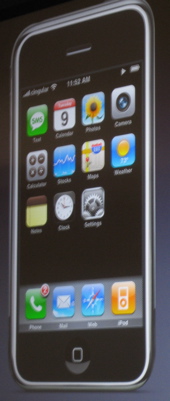
Michael Ducker: True, I guess we'll have to wait until June for
that. But forget PIM, just look at the overall user interface. I
mean, they even use an icon based launcher, with 4 "application"
buttons on the bottom.
Dieter Bohn: Wow, 4 main buttons - that's old school Palm III
territory right there. Did you see the phone app? I swear they
stole that lock, stock, and barrel from the 680's new phone app. The
big thumb buttons at the bottom just scream 680. Obviously they were
probably developed concurrently, but still...
It's prettier, though, the iPhone. Period. GUI too. But you're
right that we can't say which is more "usable" until we really get to
play with the thing. But let's give some credit for cool new
interface stuff on the iPhone, like that photo interface.
Michael Ducker: Their photo interface is pretty cool. They have a
gesture that allows you to zoom into a photo just by pinching the
photo. It seems very natural. In fact, I think the key
differentiation they have is in their handling of media, in which
they brought all the beautiful iPod UI's over to this new product.
But, other key features, like Google Maps, are literally identical to
their Treo counterparts, save the pinch zoom feature.
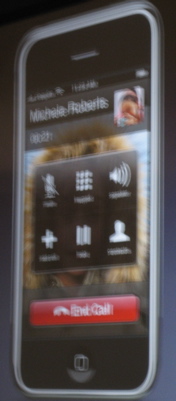
Dieter Bohn: Hm. That Google demo was identical, yeah. NOT
identical, though, their music interface, heads and tails above
anything the Treo has to offer. Not to mention the built-in storage
Michael Ducker: The built in storage is a great feature - 4 GB/8
GB are far more then the paltry 128 or so MB that the Treo offers.
But I believe it does come at the trade off of removable media, such as SD cards.
Dieter Bohn: Heh. Speaking of removable... no removable
battery? That's a bold thing in a cell phone. I still shudder when
I think of the Treo 600. But I guess that helped make it so thin.
Michael Ducker: I was thinking the Treo 300, but same difference.
I thought one of the first lessons that Palm learned was that
consumers demanded a removable battery for their cellphone. I know
tons of people who keep multiple batteries on them, because one
simply isn't enough. But it was a tradeoff. I presume that Apple was
able to use a much larger, thinner, and more spread-out lithium-
polymer battery as a result of not having to make it removable. Do
you want it thin, or do you want a removable battery?
Dieter Bohn: Yeah, it's all tradeoffs with designing these
things. Here's a question, though, do you really think they're
getting a full 5 hours of talktime on this? Or talktime/wifi time,
or whatever? It was a bit vague to me.
Michael Ducker: Yeah, Jobs seemed to leave it purposefully vague.
The tech-specs state that you can get 5 hours of talk, video
playback, or browsing, but I am fairly confident that these
activities were not measured at the same time. So this means you can
do 2 hours of talk, 1 hour of video, and 2 hours of wifi use in one battery session, but not at the same time. That said, I
doubt even these numbers. It is easy to manipulate battery life
figures - are you testing with a strong cellular signal, or a weak
signal? Are these real world, or lab tests? I bet most users will
have Wifi on and cellphone on - does this mean that your phone will
work for a total of 2 hours max?
No other slim phone has ever gotten good battery life. That is the
tradeoff for slimness, and one of the primary reasons the Treo is so
thick. While Apple's engineering is incredible, it seems hard to
believe that they have solved this one industry-wide problem in a
device that looks more power-hungry then any other.
Dieter Bohn: They're really betting the farm that making this
thing so thin is going to be compelling to consumers. You know what
else makes it thin - no real buttons. No qwerty. No dialpad. I
love the qwerty on the Treo, do you think this software/screen qwerty
will work?
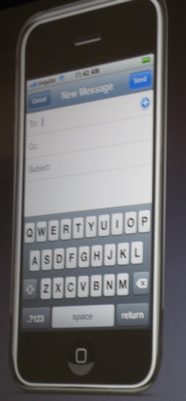
Michael Ducker: David Pogue didn't.
Dieter Bohn: orly?
Michael Ducker: yarly! He got a nifty sit down with Steve and
noted in his blog:
typing is difficult. The letter keys are just pictures on the
glass screen, so of course theres no tactile feedback.
Software helps a lot. You can afford to make a lot of typos as you
muddle through a word, because the software analyzes which keys you
*might have meant and figures out the word you wanted. Its best
guess appears just under what youve typed; if its correct, you tap
the Space bar to accept it and continue. I typed a couple of e-mail
messages with lots of typos but eventually 100 percent accuracy,
thanks to this auto-correct feature. (My testing didnt involve
proper names, however.)*
Dieter Bohn: Hm. Interesting. The tactile feedback is sort of a
big deal to me. I don't think I'd be able to use the Treo one-handed
without it.
Michael Ducker: I wish I'd had an opportunity to try it out myself.
You know, in the portable keyboard market, tons of companies have
tried to sell fabric, rubber, laser keyboards - but the only
successful products have been keyboards with actual keys. Users
prefer the tactile feedback. I don't see why the smartphone keyboard
market should be any different.
Dieter Bohn: Ok. So the iPhone wins the pretty. As far as
hardware usability, its more of a mixed bag, maybe... you know, I
never use the on-screen dial pad on my treo. It's sort of a pain.
Michael Ducker: And nobody I ever give my Treo to knows what to do
with it either - they'd rather use the tiny, but physical buttons to
dial.
Dieter Bohn: Heh. Ditto. Ok. So that's a tradeoff there.
We're starting to get out of the reality distortion field here.
Funny. I wonder what other tradeoffs (compromises?) they've made.
Developers, Carriers, and Smartphones
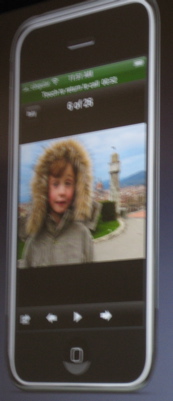
Michael Ducker: Well for one, it's not really a smartphone
platform yet. While Apple touted the iPhone's ability run "OS X", and
flashed a bunch of the developer technologies on the screen, the
platform isn't even open to third parties at the moment.
Dieter Bohn: What?!
Michael Ducker: At least, according to Michael Gartenberg, who's
the VP and Research Director of JupiterResearch (and a friend of
TreoCentral). Check his blog: "1. It's
not extensible by third parties, only Apple. The means at the moment
no RSS readers, no Slingplayers."
Dieter Bohn: Man. So much for trying to foster a developer
community. Why do you suppose they did that?
Michael Ducker: I have two gut feelings. Control of the user, and
control of the stability of the platform.
Dieter Bohn: Control of the user experience you mean?
Michael Ducker: That's a great way to sum it up. This is a
complicated device in itself, Apple and Cingular probably do not want
to have to deal with the support of users having troubles with third
party applications. Secondly, the platform may not be mature enough
to deal with all the bugs that third-party developers may find in the
new operating system, nor might the operating system be ready to
truly handle the real-time nature of the phone while running any
random application (all struggles that the Treo has dealt with and
matured through).
Dieter Bohn: That brings up a couple of points for me. Apple
likes vertically integrated devices - look at the iPod - they
control the user experience of every step, iPod, iTunes, Syncing,
etc. And your point about support definitely fits with that theme
too. But there's another point here - sorta related to the Treo -
not only are the devs locked out, but Cingular is locked out.
Cingular basically got out of Apple's way here. No silly little
Cingular-branded crap services. It's like Apple said "We're going to
make the device we want to make in the way we want to make it and
you'll like it."
...And Cingular said "Yes, Sir! May I have another?" 180 degrees
from the fights Palm seems to have to go through with the carriers.
Michael Ducker: I think Stan Sigman (Cingular's CEO) put it a bit
more nicely in the keynote: "...Ours is a unique relationship that
allows Apple to be Apple, and Cingular to be Cingular." ...which
certainly seems to be the case here
Dieter Bohn: I really hope that becomes a trend - Carriers
getting out of the way to let innovative device makers (ex. Apple and
hopefully Palm) do their thing.
Michael Ducker: I hope so too... I wouldn't hold my breath though.
Sometimes, exclusivity isn't all that it's cracked up to be... What
if Cingular is exclusive (and according to CNN,
this exclusive lasts through the end of 2009), because nobody else
would bend to Apple' demands (IE, no other carrier wanted to give up
this much control of the consumer). Having such a long-term
exclusivity is odd - essentially, Apple's giving up 2/3rds of the US
cellphone market for the next 3 years.
Dieter Bohn: hm. Well I guess the charitable way to read that is
to say "Kudos to Cingular for being willing to shake things up." The
uncharitable way to read that is "Sprint and Verizon didn't think
much of the iPhone." Or maybe Apple just thinks GSM is better.
Speaking of GSM..
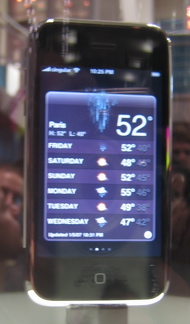
Michael Ducker: The phone isn't 3G!
Dieter Bohn: Exactly. That's weird. Cost? Size? Power Consumption? Development too complicated? Bad user
experience? What drove that decision? Maybe all of the above.
Tradeoffs again. If nothing else, it's a clear indication that
Cingular stayed out of the design process - they would have never
stood for not getting people on 3G data plans.
Michael Ducker: Good point. Do you really think Apple likes EDGE that much? The inclusion of Wifi (and the promise of seemless network handoffs), is most certainly a way to get around the network problems.
Dieter Bohn: Well, it does cut down on development costs when
they try to sell it worldwide. I'll tell you what, though, Sprint
and Verizon are probably calling every manufacturer known to mankind
looking for a competitive product.
Michael Ducker: Sounds like an opening for Palm?
Dieter Bohn: Sounds like an opening for Jeff Hawkin's "Mystery
Device." To be honest, all I want is for other carriers to follow
Cingular's lead of not having a death grip on the entire design
process and not pushing around device makers so much.
Michael Ducker: ...And at least for now, Cingular is still a
great partner to Palm. According to Somsak, "I think we've got a
great relationship with Cingular. We just launched the new Treo 750
with them, and just a few months ago launched the $199 Palm OS Treo
680.. We're excited, they're excited.".
But will Sprint, Verizon, T-Mobile, et al choose as partners that
will innovate and improve on the cellular platform? My bet (hope?) is
yes. But it won't look the same, exactly. For example, I wouldn't
expect Palm to sign a similar exclusivity deal. Here's another
relevant quote from Somsak: "We're all about choice. We have choice
of carriers, choice of platforms, choice of 10,000 applications. We
believe that having multiple relationships is good for the market."
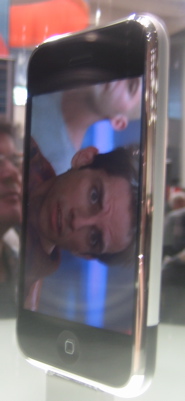
Dieter Bohn: Yeah, Palm certainly isn't lacking in choices these
days - WM, PalmOS, and like 6 different ways to get your email on
both platforms. That's maybe a double-edged sword, but it definitely
gives Palm flexibility. You know, we should go back to this
"positioning" thing from before - if this iPhone is going to grab a
bunch of consumer market share, how does Palm position itself to
"limit the damage"? Or is that too strong of language? How does
Palm get people to realize that they should consider the Treo instead
of waiting until June for the iPhone?
Michael Ducker: No "ifs" - the iPhone will grab a significant
share of the dollars spent on high end phones by consumers - Apple's
projecting 10 million units by he end of 2008... That's nearly twice
the number Treos that are out there in the world today.
From what I've seen and what we've talked about, the Treo can't
directly compete with the iPhone. It does not match its multimedia/
consumer/sexy features. So Palm, in many ways, needs to run back to
its prosumer/professional/business market with their tail between
their legs, having tasted for 5 months the prospect of being a
consumer company again. And this is the market that Palm is strongest
in - the professional market.
Dieter Bohn: Ouch. Yeah, I agree, though, Apple's basically
going to get a free few months of owning the high-end consumer
market.. Here's a funny thougt, with this iPhone, if Palm wants to
stay in the consumer market, they're suddenly the "low cost option" now.
....waitasec, why are we only talking about the iPhone as a consumer
phone and not a smartphone? Can't it do pretty much all the
"smartphone stuff?"
Michael Ducker: You mean, like Push Exchange email support, full
editing and viewing of attachments like MS Office Documents - the
whole productivity/office on the go thing?
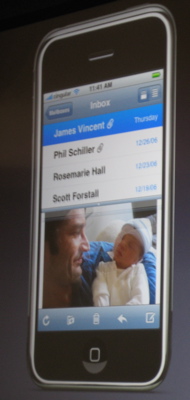
Dieter Bohn: Touché, it can't do any of those things. It
didn't even occur to me that it couldn't edit Office docs. Ok, so
the iPhone is definitely on the "consumer" end of the spectrum. I
guess that RIM is on the other end, eh? All business all the time.
Michael Ducker: Yeah, which isn't a terrible place to be, even
though Palm hasn't quite been able to deliver a knockout punch
there. But most reviewers still seem to give Palm the edge over
Blackberry in terms of user experience and flexibility.
Dieter Bohn: Yeah.. if Palm could only find a way to just crush
RIM into minute particles they'd definitely be able to stop worry
about their market niche getting squeezed into nothing. But that's
not exactly likely, is it?
Michael Ducker: What was it that Palm once told us... Palm users
get to do business and have fun? ...Ahh, the marketers always tell it best: Go Somsak!:
Our target market wants to have a great phone first, that's what
our product is first and foremost, that is a great phone. It has very
rich email including attachments, including the ability interact with
attachments, integrate with Outlook and Exchange. Our customers
really value quick and easy text entry and web navigation. [...] Each
product is optimized for a particular market segment, Apple is
looking at a multimedia/entertainment first. We're looking for the
prosumer/office first
Dieter Bohn: Sure sounds like they're taking aim at Research in
Motion. But moving targets are hard to hit.
Michael Ducker: Groan.
Dieter Bohn: Sorry. Too easy. But I don't think Palm needs to
necessarily give up on the consumer market. They definitely will be
able to compete on price, but they need to ramp up their industrial design to appeal to people on a more emotional level - the Blackberry Pearl? Beautiful.
On functionality... tougher.
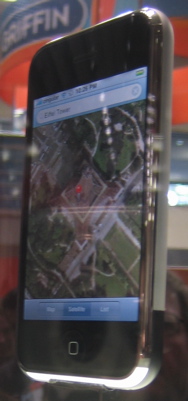
I guess it boils down to this, if the iPhone ends up sucking at text
messaging and/or email, then it's pretty much academic that Palm
won't get pushed out of the consumer market - there will still be a
strong piece of the pie left for the Treo. If the iPhone ends up
being pretty good at it, well, then either Palm has to retreat back
into "Mostly Business" or take Apple head-on in the consumer
space ...or just try to find a niche in the middle.
Michael Ducker: So here's the thing. I really like what I've seen
of iPhone. I don't know of any other phone that you turn on by
stroking it... It's almost ..dirty.. and I like that. I don't know
any other phone with such sex appeal. And I don't know any other
phone that can do media like the iPhone claims to be able to do.
But the iPhone is not a smartphone. It is not a platform (yet). The
Treo is a platform, and I still feel that the Treo is an extremely
strong product. The physical keyboard makes a difference. If Palm can
fix their Operating Systems woes, and bring their visual look and web
browsing up to date, the Treo will still be a great competitor.
Look at it this way. Palm already survived one Newton, why is this
iPhone just not another Newton?
Dieter Bohn: That's an interesting observation. But Apple made
some mistakes in marketing and designing the Newton, maybe - and the
very things they screwed up with the Newton they're Vikings at now.
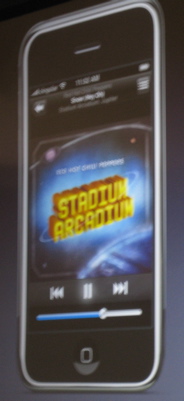
Michael Ducker: Fine. Still, though, a lot of the phone/
communication user interface innovations that Apple is introducing
were all invented by Palm. Ringer Switch? Palm. Threaded SMS? Palm.
Better Voicemail control? Well, Palm had the idea, but unfortunately
couldn't go all the way through with it. Palm paved the way for much
of the UI used in the iPhone.
Dieter Bohn: I hadn't looked at it that way. To be perfectly
honest, Palm still "gets it" when it comes to user interface design,
I think, but they've just been hobbled with either an out-of-date
platform (PalmOS) or one with a really bad user interface they have
to fix (Windows Mobile). If Palm could build their own interface
from the ground up...
Michael Ducker: Exactly. You've pointed out that Palm's dumping
as much money as they can into software R&D...
Dieter Bohn: Heck 80% of their engineers are software engineers.
Michael Ducker: So I guess the bottom line is that the Treo's not
dead, not by a long shot. Apple will more likely squeeze the sides and certainly effect the smart-phone market, but by no means is this the end of the Treo. The real companies to be concerned are the Motorola's and SonyEricsson's of the world, who have been trying to sell more expensive, more powerful media devices to the consumer.
Dieter Bohn: I think you're right. And as corny as this sounds,
I have to say it: more competition is good, more innovation is good.
It may help the carriers be less restrictive. It may give other
device makers license to try wackier things. It drives cost down.
Michael Ducker: You getting an iPhone?
Dieter Bohn: Obviously. You?
Michael Ducker: Obviously. Keeping your Treo, though?
Dieter Bohn: Looks that way, yep. I'm no businessman, but I need
productivity on the go. You?
Michael Ducker: Same deal. I think yesterday I put in 7 hours on my Treo covering macworld. 3 hours as a modem, 1 hour browsing the web, and 3 hours on the phone. Oh, and 143 text messages. I don't think the iPhone's going to be able to do that just yet.